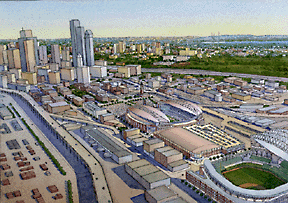

Hours before 74,000 people packed Husky Stadium for the UW-UCLA football game last October, UW Geography Professor Bill Beyers stood in front of 250 football fans and gave them a quiz he knew they would fail.
Beyers is an expert on economic impact studies. He's done them on "high tech" industries, the arts, the Fred Hutchinson Cancer Research Center, and for both the Seattle Seahawks football team and the Seattle Mariners baseball team. Last fall, the UW invited him to give an insider's view of sports economics as one of several free lectures held prior to home games.
To warm up his audience, Beyers held a "pop" quiz. "I'm going to give you three different percentages for the economic impact of sports on the local economy, and you raise your hand for what you think is the right answer," he said.
"Ten percent." (A good number of hands rise.) "One percent." (A majority of hands are held high.) "One-tenth of one percent." (Hardly a hand in the air.)
"The correct answer is 1/10th of one percent, and even that is probably overstating it," Beyers told the crowd.
His listeners were shocked. To justify the expenditure of public money on sports stadiums, politicians across the nation have pointed to the economic benefits of professional sports.
Those arguments have been flooding the airwaves in Washington this spring, as football fans--and all of Washington's voters--face much more than a pop quiz on professional sports. On June 17 they will be voting on a $325 million tax package to tear down the Kingdome and build an outdoor football stadium in its place. Microsoft co-founder Paul Allen has an option to buy the Seahawks, but he will drop the option if the team doesn't get a new stadium. Allen is willing to cover $100 million of the construction cost.

The vote comes on top of a $414 million price tag for a new baseball stadium already under construction south of the Kingdome. After King County voters narrowly defeated one funding package, the 1995 State Legislature went into special session to pass a different tax package to fund construction. The ballpark is scheduled to open during the 1999 baseball season.
When asked why public funds should finance private facilities for professional sports, supporters cite economics. Football Northwest, Allen's group advocating a new stadium, notes, "Even if you aren't a football fan, the high level of economic activity generated by the Seahawks does affect you. Because of the revenues generated by professional football--$5.4 million are contributed to the local and state general funds--everyone benefits. The Seahawks' total annual economic impact in Washington state is $129 million. In King County alone, the Seahawks generate $103 million per year."
These arguments are made throughout the U.S. When Baltimore lured the Cleveland Browns with the promise of a $200 million stadium, Maryland Gov. Parris Glenening said the deal would generate 1,400 new jobs and $123 million annually to the Maryland economy.
"New Money": A True Measure of the Economic
Impact
Pro Sports' Contribution to the Public
Good
Economics vs Entertainment: How Much Are We
Willing to Pay?
Send a letter to the editor at columns@u.washington.edu.